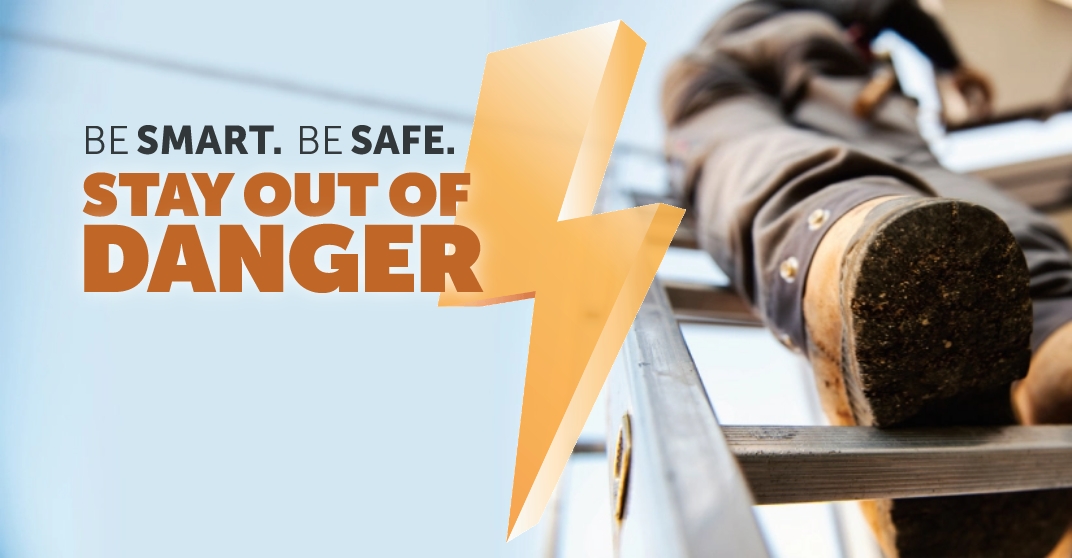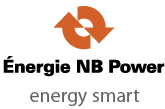At Home

ALWAYS TREAT A DOWNED POWER LINE AS LIVE AND EXTREMELY DANGEROUS.
If you see a downed power line, stay at least 10 meters or 33 feet away (the length of a bus).
Call 911 immediately
REPORT THE DOWNED WIRE TO NB POWER AT 1-800-663-6272.
Safety outside your home
Look for overhead wires before moving equipment or tools. Call NB Power 1 800 663-6272 to:
- Mark underground lines
- De-energize and insulate overhead lines
- Raise overhead lines
- Provide warning signs for hazardous areas You should keep clear of all large equipment working around power lines.
Look up!
Check the surrounding area to ensure that you will not accidentally come in contact with overhead power lines. Remember minimum safe distances of approach:
Distribution lines
A Up to 750 volts - 0.9 metres (3 feet)
B 750 to 100 kilovolts - 3.6 metres (12 feet)

Transmission lines
C 101 to 250 kv - 5.2 metres (17 feet)
D 251 to 345 kv - 6.1 metres (20 feet)


Look down!
Some power lines are buried as little as one foot underground. Be sure you know where power lines are located before digging to install a fence, plant a tree or dig holes.

Safety inside your home

Electrical Cords
Safety tips for electrical cords:
- Always replace worn or damaged electrical cords or wires. Or, have them repaired by a qualified person.
- Keep cords in sight. Don’t hide them under carpets or behind furniture. It is not safe to put electrical cords under mats or carpets even if they are taped down. The action of walking on these carpets will wear the protective covering on the cords.
- Always use power bars with surge protection for stereos, entertainment systems and computers.
- Never remove a plug by pulling on the cord.
- Don’t use frayed cords.
- Don’t allow cords to come in contact with electrical elements.
- Don’t pick up tools or electrical appliances by cords.
- Don’t rely on extension cords for permanent wiring.

Appliances
Safety tips when using appliances:
- Use appliances approved by a certification organization recognized by Technical Inspection Services. All safe electrical appliances have approved stickers or seals.
- Ensure appliances are always well-maintained.
- Don’t plug or unplug appliances with wet hands.
- Keep electrical appliances away from water.
- Unplug your oven before cleaning it.
- Electrical appliances in the basement can shock you if your basement floods. Stay upstairs.
- Make sure electrical tools such as steam cleaners or electric lawn mowers don’t come in contact with electrical cords.
- All electrical appliance and tool repairs should be done by a qualified person. If you attempt to make repairs, always unplug the appliance or tool first.

Electrical Outlets
The amount of electricity coming from your outlets in your home is enough to be dangerous. Some important safety tips are:
- Wall sockets can only handle two plugs safely. Don’t overload outlets by using an “octopus” (an outlet with several plugged-in cords) or splitters.
- Cover outlets to prevent children from inserting objects into the outlets.
- All sockets in wet or damp environments - bathrooms, around sinks or outside - should have special circuits called ground fault circuit interrupters. These simple devices prevent shocks. An electrical contractor can install them.

Electrical Panels
Electrical panels are at the heart of your home’s electricity. Here are a few tips for dealing with them safely:
- Never use a fuse with higher amperage than required. The system may overheat and cause a fire. Verify a fuse’s amperage before replacing it.
- Replace loose fuses and worn circuit panels.
- Make sure stand-by generators are installed properly by contacting an electrical inspector or contractor. Improper installation may create safety hazards to you and NB Power line workers and may damage the generator.
- Be aware of warning signals that could indicate fuse box problems. Contact an electrician if circuit breakers open or fuses repeatedly blow for no apparent reason, or if you detect rust in the fuse box.









